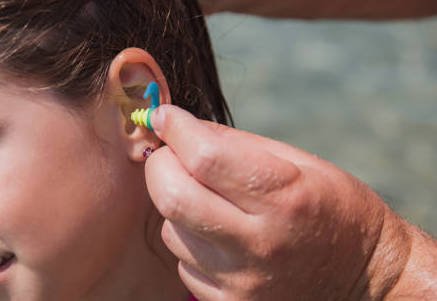Swimmer’s Ear: Causes, Symptoms & Treatments
Ear infections are fairly common, and not usually a cause for concern. If you’re worried you might have an ear infection that may be Swimmer’s Ear, read on to learn more about the condition and what you can do about it.
Many audiologists can help treat the problem, and if you’re local to Suffolk you can call Ear View or book online for professional advice and treatment.
What is Swimmer’s Ear?
Swimmer’s Ear, known medically as otitis externa, is an infection in the outer ear canal caused by harmful bacteria, usually due to damp or unsanitary conditions in the ear canal. Someone with Swimmer’s Ear might experience inflammation, dry skin in the ear canal, and the ears may be sensitive to touch.
What causes Swimmer’s Ear?
Swimmer’s Ear is most commonly caused by a build up of water in the ear canal, which can harbour bacteria and lead to an infection. Some of the leading causes include:
Water left in ear canal after swimming or showering
Humid conditions
Contact with contaminated water in the ear canal
Use of cotton buds or Q-tips in the ear, which can damage the skin and leave the ear canal susceptible to infection
Damage from objects in the ear such as ear buds, ear plugs or hearing aids
Swimmer’s Ear can also be caused by allergic reactions or autoimmune conditions.
Who is most at risk of Swimmer’s Ear?
Unsurprisingly, those who regularly go swimming have an increased risk of picking up the infection. But it’s not just swimmers who are at risk: those with skin conditions such as dermatitis, eczema or psoriasis that affect the inner ear are at a higher risk of contracting Swimmer’s Ear, as the damaged skin is more vulnerable to the bacteria. Also those who live in humid areas, or areas with contaminated water, should take extra care to keep their ears clean.
What are the symptoms of Swimmer’s Ear?
Some of the most common symptoms of Swimmer’s Ear can be diagnosed from a physical examination. Others may require more in depth examination by a professional. The most commonly experienced symptoms of Swimmer’s Ear include:
Inflammation, or redness, around the outer ear canal
Dry, scaly skin around the ear canal
Swollen lymph nodes
Pain when touching the outer ear
Pus or fluid discharge from the ear
Hearing loss
Difficulty chewing, or pain in the jaw
How long does Swimmer’s Ear last?
Some mild infections can take a few weeks to heal without medical treatment, but more severe cases can take longer, and it’s advised that you seek help to prevent lasting damage. Most cases of Swimmer’s Ear that are treated properly will clear up in a week or two, depending on the severity.
What treatments and/or cures work for Swimmer’s Ear?
As with all medical conditions, treatments depend on the severity of the infection and on the patient. Some treatments that might be given to treat Swimmer’s Ear are:
Antibiotic, antifungal or anti-inflammatory ear drops
Over the counter painkillers, such as ibuprofen
Microsuction can be a useful treatment to remove contamination or blockages from the ear canal. If you’re local to Suffolk, you can call Ear View or book online for an appointment with a professional audiologist who can discuss options with you.
How can I avoid getting Swimmer’s Ear?
The best way to avoid Swimmer’s Ear is to keep your ears clean and healthy. When swimming, ensure that the water is clean and sanitary, and make sure your ears are dry and clean afterwards. If you have a condition that affects the skin inside your ear, taking extra precautions to keep your ears dry and clean during or after showering can help prevent Swimmer’s Ear. Most importantly, avoid sticking objects such as cotton buds or Q-tips inside your ear canal, as this can cause more harm than good!
What’s the next step if the above treatments don’t work?
If you find yourself struggling with an ear infection, it’s always best to speak to a professional. They can take a look and diagnose the problem, and find the best way to treat it based on your needs.


